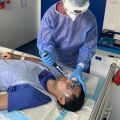New data show rise in hospital admissions for unvaccinated pregnant women
30 July 2021
The Chief Midwifery Officer for England will urge expectant mums to have their COVID-19 vaccination as soon as possible. This follows a worrying rise in unvaccinated women being admitted to hospital with severe COVID-19, and evidence that the Delta variant poses a significantly greater risk than all previous strains.
COVID-19 poses significant risks to both mother and baby. Pregnant women are particularly vulnerable to becoming severely ill from COVID-19, and around one in ten pregnant women admitted to hospital with symptoms of COVID-19 require intensive care. One in five pregnant women admitted to hospital with symptoms of COVID-19 gives birth prematurely. New data from the UK Obstetric Surveillance System (UKOSS), published on medRxiv, show that COVID-19 vaccinations offer effective protection from these risks. This new analysis reports information on all pregnant women admitted with symptoms of confirmed COVID-19 in pregnancy in the UK from the beginning of the pandemic up to 11 July 2021.
The data show:
- 3371 pregnant women have been admitted to hospital with symptomatic COVID-19.
- The severity of women’s illness appears to have become worse; 24% of women admitted in the first wave had moderate or severe disease, compared with 36% with the Alpha variant and 45% with the Delta variant.
- Vaccination data has been collected since 1 February 2021. Of 742 women admitted since that date, only four have received a single dose of vaccine and none have received both doses.
This means that more than 99% of pregnant women admitted to hospital with symptomatic COVID-19 are unvaccinated. In comparison, 60% of the general population admitted to hospital with COVID-19 are unvaccinated. During this time, at least 55,000 pregnant women have received one or more doses of a COVID vaccine in the UK.
Marian Knight, Professor of Maternal and Child Population Health at the Nuffield Department of Population Health, University of Oxford and chief investigator of the study, said: ‘It is extremely good news that so few vaccinated pregnant women have been admitted to hospital with COVID-19. However, it is very concerning that admissions of pregnant women to hospital with COVID-19 are increasing and that pregnant women appear to be more severely affected by the Delta variant of the disease.
‘Around 200 pregnant women were admitted to hospital with COVID-19 last week. I cannot emphasise more strongly how important it is for pregnant women to get vaccinated in order to protect both them and their baby. Until they are vaccinated, pregnant women must continue to be extremely attentive to social distancing measures including mask wearing, 2m distancing and meeting outdoors where possible.’
Nicola Vousden, Registrar in Public Health at the Nuffield Department of Population Health and the first author of the study said: ‘Worldwide more than 200,000 pregnant women have now received a COVID vaccine, with more than 50,000 in the UK. This study shows that very few pregnant women are admitted to hospital with COVID-19 after they have received a vaccine. Other studies have shown that women who have received a vaccine pass on antibodies to their babies, so the benefits of vaccination to both pregnant women and their babies are clear.’
The Royal College of Obstetricians and Gynaecologists and the Royal College of Midwives recommend that unvaccinated women who are pregnant or considering pregnancy get their vaccine as soon as possible, and book their second doses once they are eligible.
The study, funded by the National Institute for Health Research (NIHR), showed that women admitted in the Alpha period were more likely to require respiratory support, have pneumonia, and be admitted to intensive care, compared to women admitted in the first wave. Women admitted during the Delta period had a further increase in risk compared to those admitted in the Alpha period, with a greater proportion having pneumonia.
Babies born to mothers in the Alpha period were more likely to require admission for neonatal care compared to the first wave. A similar proportion of babies born to mothers in the Delta period were admitted for neonatal care compared to the Alpha period, but more than half of the mothers admitted during the Delta period have yet to give birth.
Notes to editors:
For interview requests, please contact: Dr Caroline Wood, [email protected] or Professor Marian Knight, [email protected]
For further information on COVID-19 vaccine advice for pregnant women from the NHS, contact Kirsty Callingham, [email protected]
About the University of Oxford
Oxford University has been placed number 1 in the Times Higher Education World University Rankings for the third year running, and at the heart of this success is our ground-breaking research and innovation. Oxford is world-famous for research excellence and home to some of the most talented people from across the globe. Our work helps the lives of millions, solving real-world problems through a huge network of partnerships and collaborations. The breadth and interdisciplinary nature of our research sparks imaginative and inventive insights and solutions. Through its research commercialisation arm, Oxford University Innovation, Oxford is the highest university patent filer in the UK and is ranked first in the UK for university spinouts, having created more than 170 new companies since 1988. Over a third of these companies have been created in the past three years.
About the Nuffield Department of Population Health, University of Oxford
The Nuffield Department of Population Health (NDPH) is a world-leading research institute which investigates the causes and prevention of disease. NDPH has over 500 staff working in a number of world-renowned population health research groups, including the Clinical Trial Service Unit and Epidemiological Studies Unit (CTSU), the Cancer Epidemiology Unit (CEU), the National Perinatal Epidemiology Unit (NPEU), and other groups working on public health, health economics, ethics, disease prevention, and health record linkage. It is also a key partner in the Oxford University Big Data Institute.
About the National Institute for Health Research
The mission of the National Institute for Health Research (NIHR) is to improve the health and wealth of the nation through research. We do this by:
- Funding high quality, timely research that benefits the NHS, public health and social care;
- Investing in world-class expertise, facilities and a skilled delivery workforce to translate discoveries into improved treatments and services;
- Partnering with patients, service users, carers and communities, improving the relevance, quality and impact of our research;
- Attracting, training and supporting the best researchers to tackle complex health and social care challenges;
- Collaborating with other public funders, charities and industry to help shape a cohesive and globally competitive research system;
- Funding applied global health research and training to meet the needs of the poorest people in low and middle income countries.
NIHR is funded by the Department of Health and Social Care. Its work in low and middle income countries is principally funded through UK Aid from the UK government.
 Ground-breaking study reveals how COVID-19 vaccines prevent severe disease
Ground-breaking study reveals how COVID-19 vaccines prevent severe disease
 Novel triple drug combination effective against antibiotic-resistant bacteria
Novel triple drug combination effective against antibiotic-resistant bacteria
 Researchers discover how immune cells hunt down cancer around the body
Researchers discover how immune cells hunt down cancer around the body
 New algorithm supercharges climate models and could lead to better predictions of future climate change
New algorithm supercharges climate models and could lead to better predictions of future climate change
 New study to improve vaccines and therapeutics development
New study to improve vaccines and therapeutics development